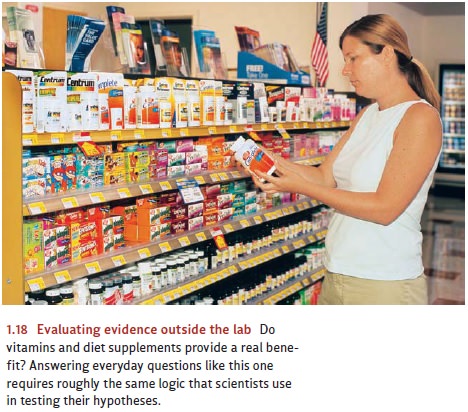Chapter: Psychology: Research Methods
The Power of Science
THE POWER OF SCIENCE
The commitment to scientific
inquiry has served psychology remarkably well. Psychologists know an enormous
amount about human behaviors, feelings, and thoughts, and we know how humans
differ from other species as well as how we resemble them. Moreover, we’re
quite certain about these things—our claims are not matters of conjecture or
opinion, but assertions rooted in well-established facts.
Before leaving this, though, we
should point out that the scientific method, with all of its controls and
precautions, is also useful in other domains. Specifically, the logic of
science can also help people to draw more sensible conclusions from their
everyday experiences.
Consider Jesse, who always takes
a large dose of vitamin C when she feels a cold coming on. Jesse has noticed
that her colds are usually mild and brief, and she con-cludes that the vitamins
help her (Figure 1.18). Or think about Sol, who checks his horoscope online
every morning and believes that the forecast is usually correct: Whenever the
stars indicate that he’s going to have a day filled with new opportunities, he
does! Likewise, Julie had been hoping for months that Jacob would show some
inter-est in her. After suspecting that he was turned off by her shyness, she
tried to act less timid when he was around—and now they’re great friends. Julie
concludes that her shift in approach was a success. In all of these cases,
people are drawing conclusions based on their experiences. Are their
conclusions justified?
Notice that Jesse always takes
vitamin C when she’s coming down with a cold. As a result, she has an
experimental “group” (herself ) that takes the pill, but no control group
(people who take no vitamins). It’s possible that her colds would be just as
mild without the vitamins, and so her conclusion that the vitamin C helps is
unwarranted.

Sol does have a basis for comparison—days with a certain astrological prediction (such as the promise of new opportunities) versus days with a different prediction.
Even so, there’s a flaw in Sol’s
reasoning. Notice that he reads his horoscope every morning, so he starts each
day with expectations based on the astrological forecast he has read. Perhaps
he’s more likely to notice his opportunities whenever the fore-cast has alerted
him to look for them. In this case, the pattern Sol has observed might support
the power of positive expectations, but it says nothing about the accuracy of
astrology.
Julie’s comparison (acting timid
versus acting bold) is also problematic. Maybe Jacob is just slow in noticing
people; so it wasn’t her boldness, but merely the passage of time, that made
the difference.
As these examples show, the
scientist’s concerns also apply to cases of common-sense reasoning. In the
laboratory and in life, comparisons are needed if we hope to draw convincing
conclusions. In both arenas, we need to rule out sources of ambigu-ity if we
wish to be certain about the factors leading to a particular outcome. In these
ways, the logic of scientific investigation turns out to have a use outside of
the labora-tory. What’s more, by using this logic, we can avoid drawing
unwarranted conclusions and end up with a clearer, more accurate understanding
of our personal and social environment.
The methods of science can apply
to our daily lives in another way: Scientists take evidence very seriously, and
they don’t continue to make claims that are contradicted by the evidence. To be
sure, scientists often hesitate to abandon their theories; and so they
carefully scrutinize challenges to their beliefs. But when the evidence makes
it plain that a particular belief is mistaken, then the belief must be set
aside.
The same attitude would serve
people well in many daily activities. Of course, each of us holds many beliefs
that depend on our values rather than facts, and these beliefs are not subject
to scientific testing. But when our beliefs do rest on empirical claims— i.e., claims that can be true or false, depending
on the facts—it is surely unwise to ignore the facts. As one example, for many
years—and despite compelling scientific evidence—policy-makers denied a
connection between cigarette smoking and health problems. The cost of this
failure to take the evidence seriously is plain. Likewise, the evidence that
human activities contribute to global warming is now overwhelming; but for
years, many politicians chose to ignore this evidence and offered policies that
increased the damage to our planet’s climate systems. Examples like these are
powerful reminders of the value of science—not just as a source of specific
information, but as a broader model of the steps we need to take (and the
honesty we need to display) to keep our beliefs in line with the facts.
Related Topics